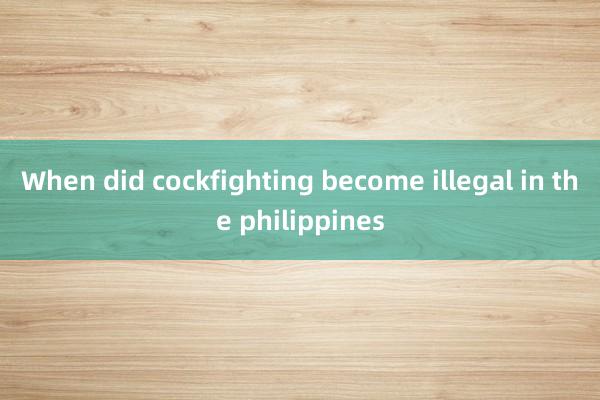When did cockfighting become illegal in the philippines

When Did Cockfighting Become Illegal in the Philippines?
Cockfighting, known as "sabong" in the Philippines, has deep cultural roots in the country, dating back centuries to pre-colonial times. It has long been a popular sport and social activity, transcending generations and becoming a symbol of camaraderie and festivity. However, despite its significance in Filipino culture, the legality of cockfighting has been a subject of controversy, particularly in the modern era when animal welfare concerns and moral debates have risen to prominence.
The Historical Context of Cockfighting
Cockfighting has been an integral part of Filipino traditions for hundreds of years, with its origins likely tied to early trading and cultural exchanges with neighboring Asian countries. The sport gained popularity during the Spanish colonial period, where it was embraced by the local population as a form of entertainment. By the 18th and 19th centuries, cockfighting had grown into a widespread activity, often held in local arenas or "cockpits."
During the American occupation of the Philippines in the early 20th century, the colonial government regulated the sport by issuing licenses for cockpits, while also attempting to curb the excessive gambling associated with it. These regulations, however, did not address the ethical concerns surrounding cockfighting, which would become more pronounced in later decades as societal attitudes evolved.
Legal Status of Cockfighting Before 2020
Prior to 2020, cockfighting was not entirely illegal in the Philippines. In fact, it was a heavily regulated activity under Presidential Decree No. 449, also known as the "Cockfighting Law of 1974." This law set the parameters for when and where cockfighting could take place. According to this decree,jili8998 cockfights were allowed only on Sundays and legal holidays,jili8998 as well as during local town fiestas. Additionally,jili8998 licensed cockpits were the only venues permitted to host these events.
Despite this regulation, cockfighting remained a controversial subject, particularly among animal rights advocates who saw it as a form of cruelty to animals. Nevertheless, for many Filipinos, it was viewed as a sport with deep cultural and social significance, providing a venue for social interaction and even economic opportunity for breeders, trainers, and cockpit operators.
The Impact of the COVID-19 Pandemic
The global COVID-19 pandemic that began in early 2020 drastically affected many industries and social activities, including cockfighting. In March 2020, as the Philippines went into lockdown, all forms of public gatherings, including cockfights, were suspended. The government implemented strict quarantine measures to curb the spread of the virus, and cockpits across the country were closed indefinitely. This marked the first time in modern history that cockfighting was halted nationwide.
tải go88The Ban on Online Cockfighting (e-Sabong)
During the pandemic, a new form of cockfighting known as "e-sabong" emerged. E-sabong is the virtual version of the sport, where people could place bets and watch cockfights online through streaming platforms. This quickly gained popularity, as traditional cockfighting was temporarily banned due to pandemic restrictions. However, the rise of e-sabong also led to significant problems, including unregulated gambling, addiction, and financial ruin for many participants.
In response to the growing concerns over e-sabong, President Rodrigo Duterte ordered the suspension of all online cockfighting operations in May 2022. His decision came after public outcry over the social costs of e-sabong, including reports of increased gambling addiction and related crimes. The Philippine Congress had earlier initiated an investigation into the negative impacts of e-sabong, particularly on the financial and social well-being of affected families. The ban on e-sabong marked a major turning point in the country's approach to regulating cockfighting.
Recent Developments and the Future of Cockfighting
While e-sabong was officially banned in 2022, traditional cockfighting remains legal under the original regulations set by the Cockfighting Law of 1974. However, the debate over its future continues, as animal welfare groups and some lawmakers push for stricter laws or an outright ban on the practice. The cultural significance of cockfighting makes it a complex issue, as it is still deeply embedded in Filipino society, particularly in rural areas where it serves as a major form of entertainment and economic activity.
The discussion around cockfighting in the Philippines mirrors similar debates happening around the world, where animal rights are increasingly prioritized. Advocates for the sport argue that it is part of the country’s heritage, while opponents stress the need for more humane treatment of animals.
Conclusion
Cockfighting in the Philippines has a long and storied history, from its early roots as a cultural pastime to its modern-day controversies. While traditional cockfighting remains legal, albeit under strict regulations, the rise and fall of e-sabong during the pandemic highlighted the challenges of regulating a sport so deeply ingrained in Filipino culture. As the country continues to grapple with issues surrounding animal welfare, gambling addiction, and public morality, the future of cockfighting remains uncertain. Whether it will be completely banned or further regulated depends on how society chooses to balance cultural heritage with evolving ethical standards.
VVJL onlinewww.melgacense.com

